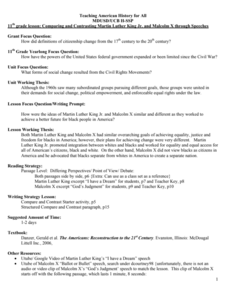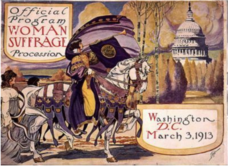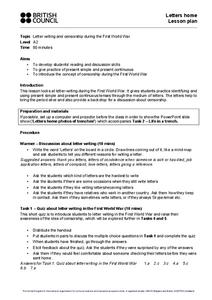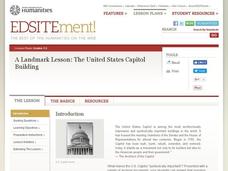Joy Uzarraga
Famous American Research Project
Designed specifically for lower elementary pupils, this is a great biographical research project in which students research a famous American, and then design creative poster boards to help them "become" the famous American they have...
Rancocas Valley Regional High School
Teaching American History for All
Although Dr. Martin Luther King, Jr. and Malcolm X both work for equal rights, social change, and political empowerment, their approaches were radically different. To better understand these contrasts, class members compare King's "I...
Common Core Sheets
Reading a Timeline
Sometimes the most important details of an informational text aren't within the text at all. Teach your class how to read timeline with a set of activities that prompts them to find specific dates and events on the timelines, as well as...
US National Archives
Documented Rights Educational Lesson Plan
How have groups struggled to have their unalienable rights recognized in the United States? Acting as a research team for the Human Rights Council of the United Nations, your young historians will break into groups to research how people...
Alabama Department of Archives and History
Extra! Extra! Read All About It?
Remember the Lusitania! As part of their study of the causes of World War I, class members examine newspaper articles and propaganda posters about the sinking of the Lusitania and then craft their own news story about the event.
Curated OER
The Women’s Suffrage Movement
A set of lessons about the women's suffrage movement will bring history to life for your middle schoolers. Learners study primary documents, learn about famous suffragettes, and compare the suffrage movement to current events...
National Endowment for the Humanities
Revolution '67, Lesson 2: What Happened in July 1967? How Do We Know?
Even in a world in which dozens of participants and curious onlookers record every controversial event, the basic facts of what happened are often in dispute. Revolution '67, Lesson 2 explores 1967 Newark, New Jersey using an examination...
National Constitution Center
Creating Your Own Town Hall Poster
Middle and high schoolers are walking into a world rife with strong political viewpoints and vocal opinions. Help to prepare them for controversial discussions with a lesson in which they choose, research, and learn more about a...
Benjamin Franklin Tercentenary
From Ben’s Pen to Our Lives
What would Ben do? Jumping off from the pseudonymous letters Ben Franklin fooled his older brother into publishing when he was still a teenager, young literary lovers dive into acting, writing, and addressing a local issue with wit and...
British Council
Letters Home
When you're writing historical fiction, the past really can become the present — especially if you're writing in the present continuous tense! Cover World War I, verb tenses, censorship, and letter writing with one informative lesson and...
Judicial Learning Center
Civil Rights and Equal Protection
Almost every American is familiar with the Supreme Court case of Brown vs. Board of Education. Far fewer understand the constitutional reasoning or the wide-ranging consequences of the ruling in the field of criminology. The interesting...
Curated OER
A Landmark Lesson: The United States Capitol Building
Students study the events in American history that affected the US Capitol Building. They name activities that happen in and around the Capitol by looking at primary source documents that are available online.
Historical Thinking Matters
Social Security: 1 Day Lesson
Should the United States provide relief for those who are unemployed? Trace this question back to the Great Depression with your young historians, who will engage in careful reading of historical documents and classroom discussion to...
PBS
Lessons in Leadership, Roosevelt Style
It's easy to criticize those in power until you're sitting at their desk, faced with the same decisions. A history lesson prompts secondary learners to research the Roosevelt presidencies through the lens of leadership and...
Teaching for Change
A Documents-Based Lesson on the Voting Rights Act
How did the Voting Rights Act affect the daily lives of American citizens? A document-based lesson developed by the Student Non-Violent Coordinating committee (SNCC) presents a case study of the impact of the Voting Rights Act of 1965 on...
Judicial Learning Center
Why Study Landmark Cases?
Why study landmark Supreme court cases? A helpful lesson offers a brief but valuable argument for the importance of these cases in the field of criminology. It introduces scholars to some key terms necessary for studying court cases and...
National Woman's History Museum
Tea with Penelope: A 2-Point Perspective of the Edenton Tea Party
A brief introduction to Penelope Barker sets the stage for a discussion about political cartoons and the persuasive technique used to create them. A graphic organizer aids scholars in the analysis of a piece of work using a 2-point...
Teach Beside Me
Benjamin Franklin Lesson Ideas
Bring Benjamin Franklin to life in the classroom with a set of five activities. Discover the type of person he was and his accomplishments through a study of his inventions and comments about life virtues.
National Park Service
Lesson 4: Escape
Some enslaved people decided to run for their liberation. Using lyrics of songs they sang, young historians look at these anthems of freedom. An assessment asks them to write the story of escape from the perspective of an enslaved person.
Curated OER
RBG Dr. Martin Luther Jr. Studies Lesson Plan-Guide
Explore Martin Luther King Jr. Students listen to a speech given by Martin Luther King, and interpret his message. They discuss civil rights and how Martin Luther King Jr. exhibited good citizenship, then brainstorm ways in which they...
Curated OER
Martin Luther King and Writing as a Tool for Social Change
Young scholars explore writing as an agent for social change. In this Social Studies lesson, students examine the power of writing using Dr. King's Letter from a Birmingham Jail. Young scholars will practice the technique of persuasive...
Agriculture in the Classroom
Growing a Nation (1930-1949): From Defeat to Victory, Lesson 2
Using primary source materials including radio broadcasts, films, and interview transcripts, history students gain a better understanding of the Dust Bowl, relief efforts for farmers, and the nation's agricultural past. It includes...
Wells Fargo
Wells Fargo History Museum: Curriculum Guide
Learn about the California Gold Rush from an institution that has been in place since the early days of the American West: Wells Fargo History Museum. From domain-specific vocabulary review to group research projects, an expansive packet...
National Endowment for the Humanities
A Debate Against Slavery
Slavery is a serious topic that can be challenging for middle schoolers to study. Young scholars can see firsthand through primary sources what occurred during that time period in the United States. The third of five lessons provides...
Other popular searches
- Esl Social Studies Lessons
- Social Studies Lessons Rome
- Social Studies Lessons Japan
- Social Studies Lessons on Maps

























